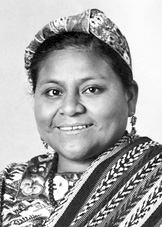
http://nobelprize.org/nobel_prizes/peace/laureates/1992/tum.jpg
|
Brief Bio and Links |

Links: |
Rigoberta Menchú Tum (b. 9 January 1959, Chimel, Quiché, Guatemala) is an indigenous Guatemalan, of the K'iche-Maya ethnic group. Menchú has dedicated her life to publicizing the plight of Guatemala's indigenous peoples during and after the Guatemalan Civil War (1960-1996), and to promoting indigenous rights in the country. She was the recipient of the 1992 Nobel Peace Prize and Prince of Asturias Award in 1998. Menchú is a UNESCO Goodwill Ambassador. She is the subject of the testimonial biography I, Rigoberta Menchú (1983) and the author of the autobiographical work, Crossing Borders. In 2006, Menchú was one of the founders of The Nobel Women's Initiative along with sister Nobel Peace Laureates Jody Williams, Shirin Ebadi, Wangari Maathai, Betty Williams and Mairead Corrigan Maguire. Six women representing North America and South America, Europe, the Middle East and Africa decided to bring together their experiences in a united effort for peace with justice and equality. It is the goal of the Nobel Women's Initiative to help strengthen work being done in support of women's rights around the world.[1] On 12 February 2007, Menchú announced that she would form an indigenous political party called Encuentro por Guatemala and that she would stand in the 2007 presidential election. Had she been elected, she would have become Latin America's fourth indigenous president after Mexico's Benito Juárez, Peru's Alejandro Toledo and Bolivia's Evo Morales, and the third Nobel laureate after Costa Rica's Óscar Arias and South Africa's Nelson Mandela to become president. She would also have become Guatemala's first female president. On September 9, 2007, Menchú received 3% of the vote. |